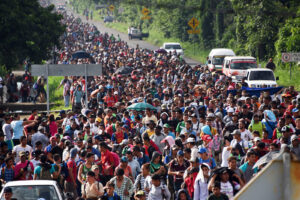The Economic Implications of Immigration Policy: An Analysis of Recent Developments

In a bold move that is reverberating across America, former President Donald Trump signed an executive order on February 19, 2025, aimed at "Ending Taxpayer Subsidization of Open Borders." This legislation represents a decisive shift in immigration policy, marking a stark contrast to the previous administration’s approach. The implications of this executive order cut deep into the fabric of American economic life, and it’s vital for citizens to understand what’s at stake.
A Shift in Enforcement
In his first month back in office, President Trump’s administration arrested approximately 20,000 undocumented migrants. While this number may seem large, many argue it’s merely a fraction of the issue at hand. The executive order mandates that federal agencies expedite actions against illegal immigration, signalling a renewed focus on enforcement rather than enabling conditions.
Brooke Rollins, Secretary of Agriculture, has made an emphatic statement on this transition. She emphasized that the era of using taxpayer funds to support illegal immigration is over. “Today’s directive affirms that the U.S. Department of Agriculture will follow the law—full stop,” Rollins declared. This directive revives restrictions dating back to the Clinton administration’s Personal Responsibility and Work Opportunity Reconciliation Act (PRWORA) of 1996, which barred undocumented immigrants from accessing federal benefits.
Historical Context and Missteps
It’s crucial to recognize that the principles behind these policies are not completely new. Bipartisan support for immigration restrictions under President Clinton illustrated a historical consensus on the need to protect American resources while addressing humanitarian concerns. However, recent administrative actions have unwound significant portions of this framework, leading to a system open to abuse and misunderstanding.
The idea that America can simultaneously extend open arms while balancing economic resources has proven to be naive. Recent findings reveal that the influx of migrants is not a spontaneous event but rather a calculated tactic employed by politicians to shape electoral demographics and economic policy.
Economic Consequences of Open Borders
At Extreme Investor Network, we argue that the economic ramifications of sustained immigration without proper checks can lead to systemic issues. As we saw in the past, societies that stretched their resources too thin faced decay and instability. The ongoing resource allocation for housing, food, and social services for migrants has, in many cases, outpaced the funding and support available for struggling Americans.
How does this translate to everyday life? When taxpayers are expected to cover increasing welfare costs and public services without consideration for their own economic wellbeing, the path leads to discontent and division. Not only do citizens feel a strain on resources, but they also face challenges such as increased taxation to cover the gaps that arise from failed immigration strategies.
The Underlying Strategy
It’s important to discuss the broader implications of today’s immigration policies. The Democratic strategy has not only invited migrants seeking better opportunities but has also reshaped the electorate and economic landscape to fortify political strength. This manipulation of demographics raises pressing questions about the viability and sustainability of current governance.
Revoking the perks that had previously been promised to migrants is a difficult but necessary undertaking. As the government seeks to recalibrate its immigration stance, there’s potential for increased tension. Recent trends indicate a likely increase in crime as individuals grapple with their sudden loss of resources essential for survival.
Moving Forward: A Call for Thoughtful Policy
The scaling back of support systems for newcomers poses a moral dilemma; we must ask ourselves: what about the individuals who made the arduous journey to the U.S., often selling everything for a chance at a better life? Many of these migrants staked their futures on the belief that the American Dream was within reach, only to have their hopes dashed by unforeseen policy changes.
At Extreme Investor Network, we advocate for solutions that don’t sacrifice compassion for control. Economic policies must work to serve both the American populace and those genuinely seeking a safe refuge. A re-examination of immigration policies is necessary not only for our citizens’ wellbeing but for the dignity of those who have sought asylum in our nation.
As we engage in this complex and ongoing debate, understanding the interplay of economics, policy, and human lives will be essential. Our goal remains: to inform, advocate, and promote strategies that genuinely uplift our communities while ensuring responsible governance.
Stay tuned with us for more insights and updates on the socioeconomic landscape as we navigate these pivotal changes together.

